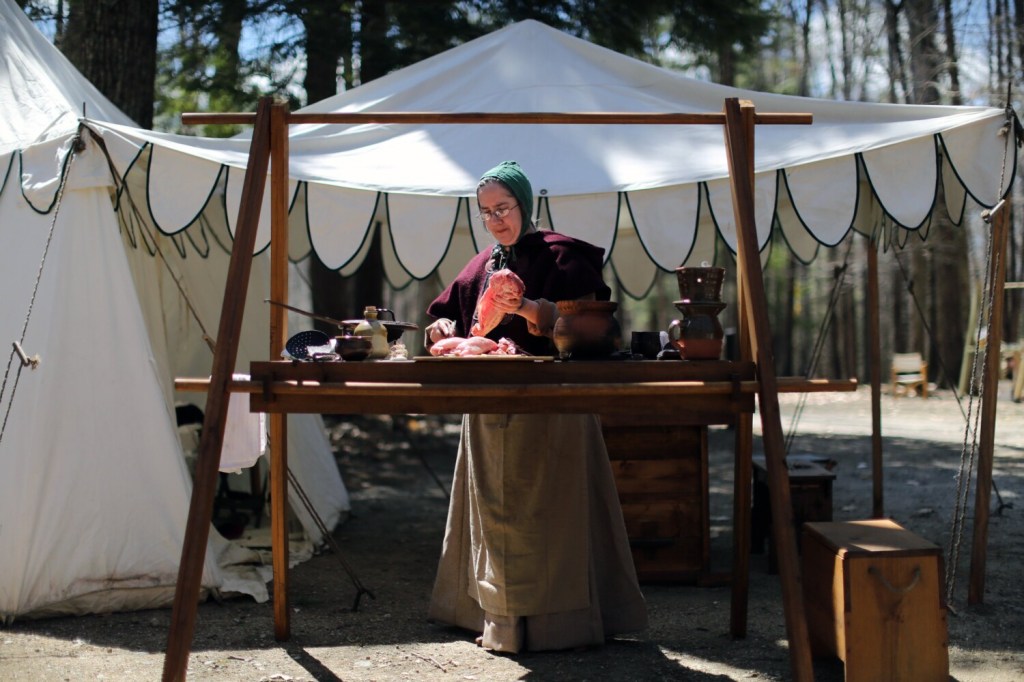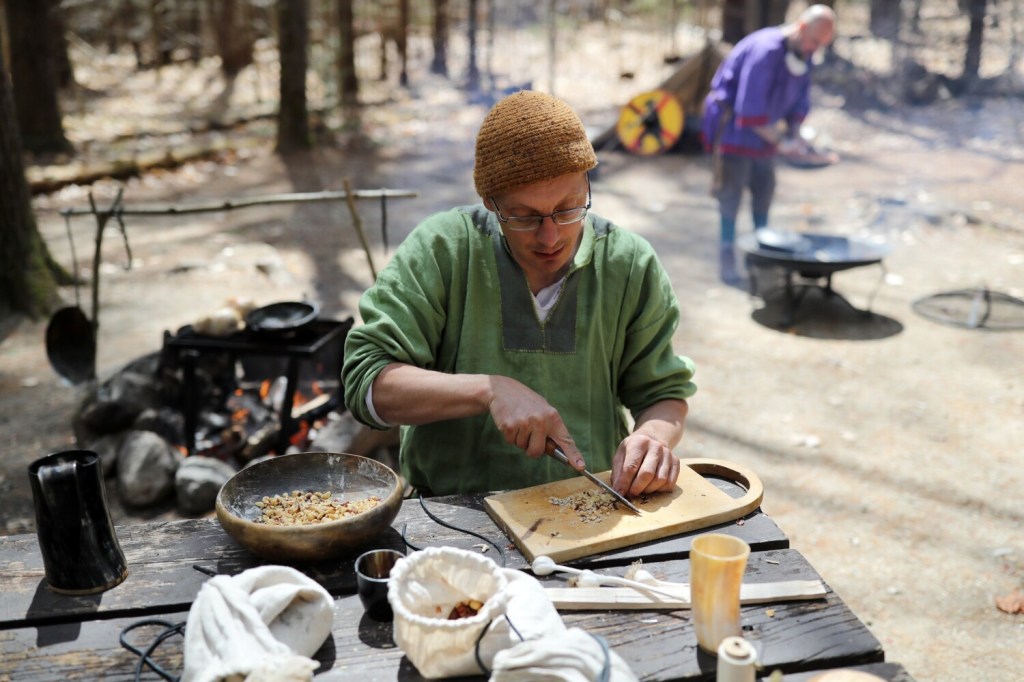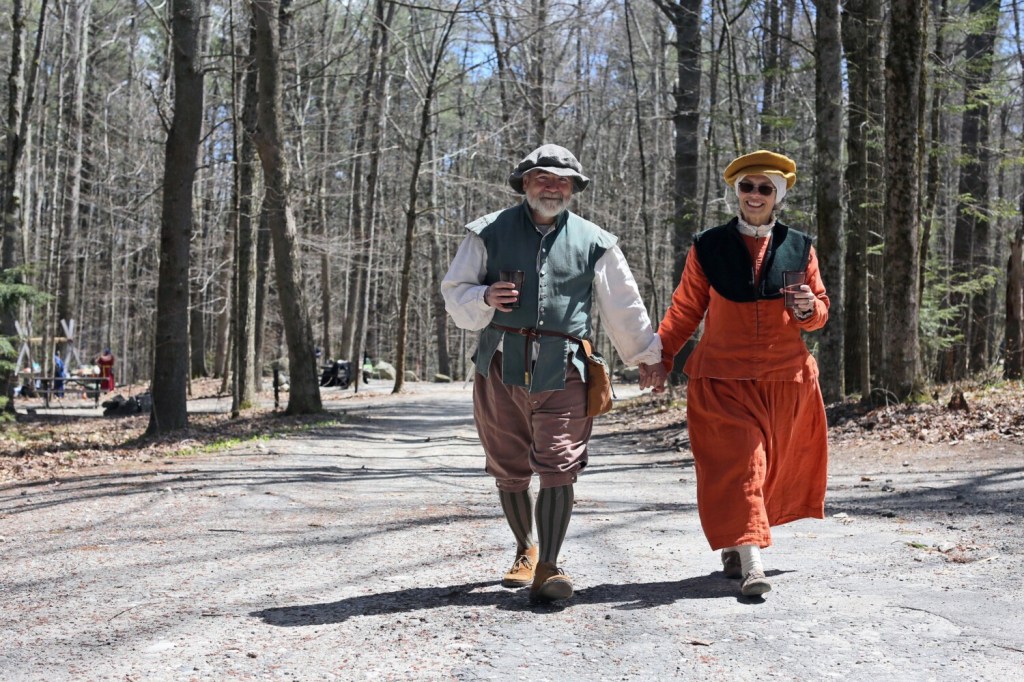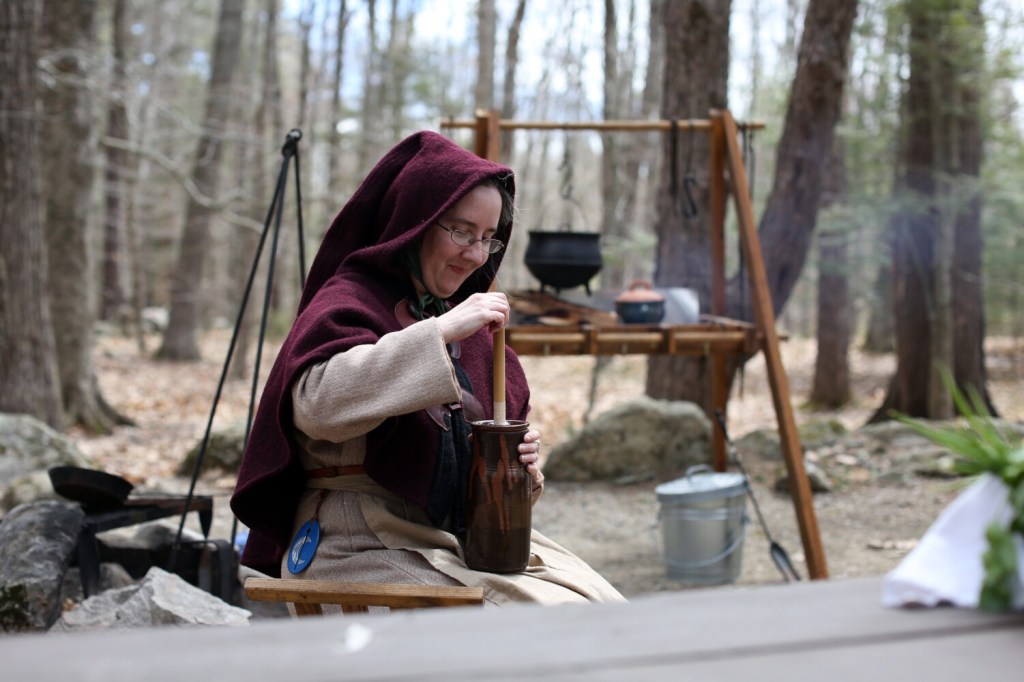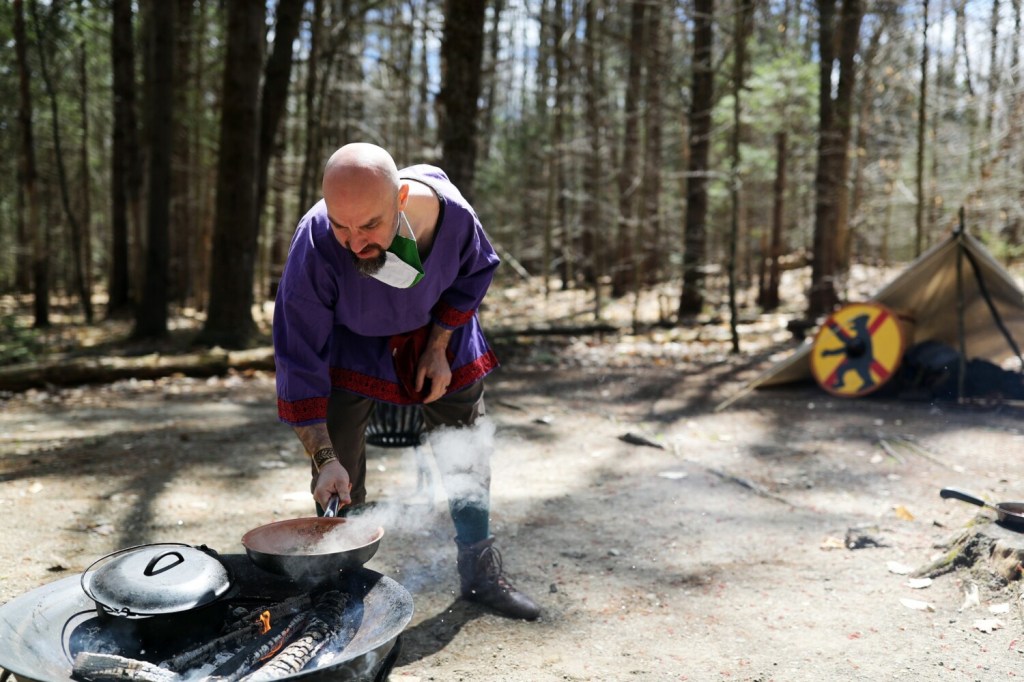POWNAL – Zoe Lawson welcomed visitors to her canvas pavilion at Bradbury Mountain State Park, where her camping area was set up with a fringed medieval tent, handmade wooden tables, benches, bowls and a handheld butter churner that Lawson pumped while walking around.
As onlookers stopped by the primitive campsite, Lawson invited them to stop back later to watch her butcher a chicken.
Welcome to campfire cooking, medieval style.
The Massachusetts woman came to join one of the Maine chapters of the Society for Creative Anachronism as they opened the camping season at Bradbury Mountain State Park a few weeks ago. About 50 turned out to share, discuss and swap recipes. Eight of them competed in the Northeast chef competition held by the southern Maine chapter of the society, a nonprofit made up of history enthusiasts who research and re-enact customs from the Middle Ages and the Renaissance.
It was the second year the southern Maine chapter, called the Province of Malagentia, held the gathering. It’s a casual kickoff to the camping season where these history buffs come to dress up, show off their medieval wares, cook over open fires and feast in a communal gathering.
“We’re really just a bunch of nerds,” said Matt Wickenheiser, a member of the Malagentia group that covers the area from roughly Augusta to the south of the state.
Since the society began more than 50 years ago in Berkeley, California, it’s grown to around 60,000 members in the U.S., Canada, Europe, Asia, South Africa and Australia – including two branches in Maine.
Several times a year members of the society gather at day-long or weekend-long rendezvous to practice medieval customs, such as fencing, archery, dance, calligraphy, cooking and simply dressing the part.
Members take on names similar to those used in medieval times, though the storylines are always fictional.
Think “Game of Thrones” – but without the violence.

Zoe Lawson of Billerica, Massachusetts, prepares a squab for a potage. Ben McCanna/Staff Photographer
Lawson, known in the Society as Morwenna O Hurlihie of early medieval England, drove from Bellerica, Massachusetts, to enjoy the relaxed cooking workshop that highlighted creativity and discouraged aiming for perfection.
“I stopped at a farm on the way here and picked up some raw milk. I let it settle and skimmed off the cream to make butter and later, I’ll make cheese. I like to experiment with food,” Lawson said.
The inaugural campfire cooking competition and gathering at Bradbury State Park took place in 2019. It returned this year after the being canceled because of the pandemic the past two years.
“The test kitchen is a new thing we threw together. It’s really a way to get ready for the camping season, to get gear ready, to try some recipes, or get tips from other people. It’s less about the competition,” Wickenheiser said.
A woman dressed in blue with a slight-jeweled crown who went by the name of Lady Octavia addressed everyone at the start of the iron-skillet competition after Wickenheiser blew a cow horn to draw them together.
As Octavaia unveiled the mystery ingredient for the campfire cooking competition – peas – laughter erupted from the crowd. Many were expecting a more challenging ingredient, possibly sheep brain or pig tongue.
Brian Hubbard of Orrington – who goes by the persona of Gwillim Kynith, a 14th-century Welshman – came with his friend Mark Barrows of Hermon, also known as Seamus Nacoille from 10th-century Ireland, and together they planned a medieval surf-and-turf offering.
Barrows looked up two recipes on the website medievalcookery.com, one a salmon roast in sauce and the other a 13th-century Dutch recipe for stewed venison.
“I got the salmon from my refrigerator,” Barrows admitted. “It’s what was left over. But a lot of us in real life are outdoor people – so fish and venison made sense.”
Both dishes were authentic medieval recipes. The fish was cooked in white wine with cinnamon, onion, oil, vinegar and ginger. The venison dish stewed in a mixture of bacon, red wine, water, cinnamon, ginger and saffron.
“They used a lot of aromatic spices,” Hubbard said. “Some people say they did that because the meat was rancid. But that’s not the case. They used a lot of nutmeg, cinnamon and cloves. A lot of it is trial and error. But it’s a lot of fun. I’ve made absolute flops.”
Lawson planned to share her butter and cheese at the potluck dinner – and to make a medieval “pottage,” a stew with rabbit and partridge, barley, parsnips, leaks – and perhaps with the peas to gain entry into the competition.
“This is a lovely relaxing event, with a focus on food. We get to experiment and try different recipes. But I’ve done some research and food has changed. Pre-Columbus there wasn’t a lot of the food we have today. Carrots, for example, weren’t orange,” Lawson said.
Conrad Maurais of Windham, who goes by Gaius Claudius Valerianus from Ancient Rome, had chicken roasting in a cast-iron pot on an open fire – literally – with the pot set on burning logs.
He worked on two different sauces, one a sweet-and-sour date sauce with red wine, vinegar and onions; the other a sesame-seed sauce that was a classic Roman dish from fermented fish.
Maurais – the cast-iron-skillet competition winner – had an actual ancient cooking book with him, or a reproduction of the Roman cookbook “Apicius.”
One page had a paragraph listing all the ingredients needed in each dish, while the opposite page offered the Latin translation. Maurais took home bragging rights for the rich flavor in the sauces he simmered and stirred throughout the morning. He did so while having to avoid the billowing smoke from his campfire.
Despite his adept use of ancient ingredients and cooking over a fire, he confided he wasn’t certain what to do with the peas. Perhaps they’d end up in a third mustard sauce.
“Roman recipes are kind of cool because dishes list ingredients but have no measurements. You don’t know how or when to add them. You have to figure that out,” Maurais said. “But that’s how I cook anyway, I just put things together until they work. It’s a lot more fun.”
Send questions/comments to the editors.


